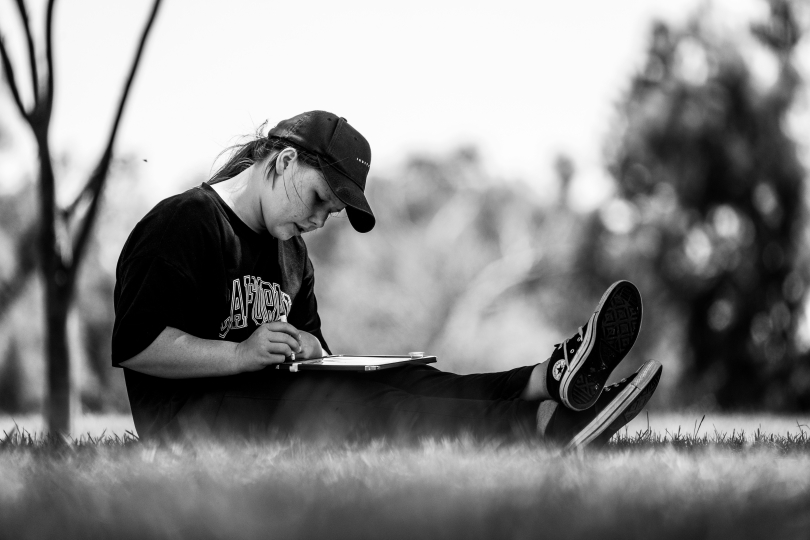
5 Inspirations for Writing Songs (Not Only) in Summer
Song lyrics are peculiar, fragile creatures that live somewhere on the border between literature and music, and they can give us a real hard time. They often show up at the most inconvenient moments – like when you're driving. And if you don’t pull over to the nearest parking lot to quickly and ruthlessly pin them down on paper or into your phone notes, they'll flutter away. Like a beautiful butterfly disappearing forever before you could grab your camera. Today, let’s explore how to find your songwriting muse during summer travels, so you return to your rehearsal rooms in the fall full of new inspiration and with a notebook packed with great lyrics.
Let’s leave the debate over whether music or lyrics come first open for now. Because it almost doesn’t matter whether you’re travelling with just a blank notebook or already have an instrumental song in your ears and are trying to figure out what it’s really about. In both cases, you’re looking for words… or maybe just one word that’s strong and rich enough to carry an entire song.
1. Hunting the muse
When I talk to other musicians about writing lyrics, the subject of 'waiting for inspiration' that never arrives comes up quite often. “I’m not writing anything right now, I’m not in the mood, nothing comes to mind...” is a common response. It's true that a certain mental state is often necessary. Maybe it’s because I’m writing this text at a cottage surrounded by meadows full of butterflies, but I can’t shake the feeling that we also need to tend to our “inner creative meadow or garden” a little. Or at least give it the space to grow – if we want to attract fluttering visitors in the form of new songs.
If our lives are a constant run between work, taking care of the family, a thousand tasks and duties and we try to squeeze in band rehearsals or gigs somewhere in between, our muses may simply fall behind, fluttering somewhere in the distance. Like in the story of the Native American who, while on a long journey, one day stopped and said, “I was going too fast, now I have to wait for my soul to catch up.” Summer is the perfect time to slow down, turn inward and gather all those scattered sources of inspiration.
And from personal experience, I know that simply changing your environment, stepping outside your everyday “routine”, can spark the desire to create. In any case, don’t forget to always have a notebook in your pocket or at least your phone ready. There’s nothing worse than coming back from vacation, telling your bandmates that you had this amazing idea for lyrics to that unfinished song, it would have been a real hit... but, unfortunately, you were scuba diving at the time, and by the time you surfaced, all you remembered was something about waves.
2. Are songs from God?
There’s a completely different approach to songwriting found in someone like Nick Cave, who often begins with lyrics when creating new music. Instead of “walking through the world waiting for inspiration,” he sits down at his desk every morning and writes. He might write for months before ideas begin to come together into lyrics, which he then refines word by word, line by line, until he’s satisfied. In many interviews, Cave talks about how his songs are about one-quarter “revelation” and three-quarters the result of work, discipline and relentless inner searching.
If you start reading his Red Hand Files, you’ll find plenty of brilliant insights on songwriting and creativity in general. For example, in response to the question: Are songs really from God?, Cave wrote:
“...But are songs from God? Sadly, not in my own experience. My good friend, Chris Martin, once told me that when he needs a new song he asks the cosmos and God sends him one. Most of us lowly songwriters are not afforded such a largesse. I can only assume God is a Coldplay fan because from where I stand, God does not send songs, dispatch, deliver or gift them; or if He does, He’s sure not sending them to me. The great W. B. Yeats summed up the position of the poet or songwriter beautifully:
I must lie down where all the ladders start, in the foul rag and bone shop of the heart.
To write a song requires a reckoning. We roll up our sleeves and through rigorous application encounter the disastrous and mortifying condition of our interior selves. We exert poetic order upon the turmoil and chaos. (…) We codify our weary souls, giving form to the blues. Eventually, if we're lucky, our songs emerge from this grim business, and we send those winged and singing things to draw God forth and attempt to animate His presence in the world. ‘Behold!’ we say, amazed at the distance travelled from our mess to the moon. Behold!"
(Red Hand Files – Issue #297 – Are songs from God?)
3. The song is inspired by the book XXX
…or by a film, a poem, a painting or a sculpture. It sounds good, it reads well in press releases, and it gives off an air of cultural awareness, which is, on the whole, hard to argue with. Or is it? Literature in particular, but really all forms of art, can be excellent sources of inspiration for songwriting. Just think of White Rabbit by Jefferson Airplane or Wuthering Heights by Kate Bush. Taylor Swift is known for hiding countless literary references in her lyrics, which her fans eagerly try to decipher. It might seem that if you don’t know what to write about, all you have to do is reach for the classics and you can’t go wrong. But it’s important to be clear why you’re doing it. Because building your song around another artist’s work can work but doesn’t always.
If you’ve just finished a gripping novel and you’re so full of it that you end up writing lyrics from the perspective of a minor character that resonated with you, that’s perfectly fine. It’s like a neighbour telling you the story of her life and you being moved to write a song based on it. Your listeners don’t know your neighbour, and they don’t have to know the novel either. You pull something out of it that’s both uniquely personal and universally relatable.
Or maybe you’re writing about a never-ending journey filled with obstacles, and the comparison to The Odyssey comes to mind – perhaps a little cliché, but fitting. Or your journey is more about freedom, and Kerouac pops into your head. Even in these cases, references to other works can add depth – as long as they’re not too obvious or completely obscure. Ideally, the listener should at least roughly understand the reference and why it’s there.
What I don’t recommend, unless you’re Taylor Swift, is stuffing your lyrics with literary references just for the sake of sounding more intellectual or artistic. That’s a fast track to lyrics that come across as either inauthentic or just plain ridiculous.
4. Stream of consciousness
There’s a far more interesting way to be inspired by literature than just dropping in references to storylines or characters. Because when it comes to the language of your lyrics, your ability to understand and work with language is absolutely essential. If you’re planning to write during your vacation, pack something worth reading, not just captivating novels, but books that inspire through their use of language. Chief among them, of course, is poetry of all kinds.
It’s also worth thinking about the type of lyrics you want to write, or rather, the type of language that fits you and your music. Are you more into abstract poetic expression or raw images from everyday life? Do you prefer writing (and possibly singing, if you're performing your own lyrics) in standard, formal language or do you lean more toward casual, even vulgar speech? Are you writing in English or another language? Let that guide your choice of literary inspiration. If you're writing poetic English lyrics, pack some English poets, or Virginia Woolf, perhaps.
And don’t forget – experimental fiction can also inspire. Next time you're staring at a blank page, try the stream of consciousness technique, famously used by Virginia Woolf. Write your thoughts freely, as they come, and see if any recurring themes emerge – ones you can turn into your next song.
5. The power of words
Words carry tremendous power, especially when paired with great music. But not everyone sees lyrics as equally important. It’s good to be aware of this and clarify your own approach when sitting down to write. On one end of the spectrum, there are artists like Nick Cave or Kae Tempest (whose breathtaking piece Europe Is Lost closes this article), for whom lyrics are the foundation and central pillar of the entire song. On the other, I know plenty of musicians who view lyrics as something that’s just “hung” onto the music – a filler, really, something that allows the melody to be sung. The simpler and more straightforward, the better.
The first group sweats over every word, finding in lyrical perfection the same thrill as in a great riff or groove. The second group might honestly be quite content to leave this "tedious" part of the process to a clever chatbot. Where do you fall on this imaginary scale? And how important are lyrics to you in the songs you listen to?
With this last inspiration, we return to the world of music – specifically to a genre where words matter more than anywhere else. “I'm beginning to feel like a Rap God…” begins Eminem’s six-minute word assault from 2013. If you want to feel how important words can be, how a perfect line can be just as exciting as a brilliant solo, put on some (good) rap. It’s my personal go-to recommendation for anyone wanting to reignite their passion for writing lyrics.
So here’s wishing you a summer full of inspiration – not just for songwriting, but in every way. Have a beautiful holiday. :)
If you have found an error or typo in the article, please let us know by e-mail info@insounder.org.


